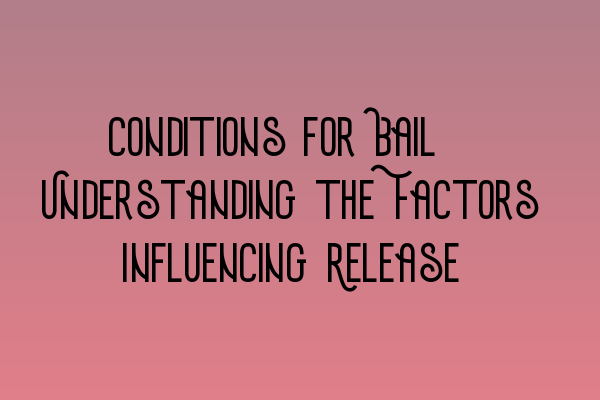Conditions for Bail: Understanding the Factors Influencing Release
When it comes to criminal cases, one crucial aspect that is often discussed is bail. Bail is the temporary release of a defendant from custody while awaiting trial. However, the granting of bail is not automatic and is subject to certain conditions and factors that influence the court’s decision.
1. Flight Risk
One of the primary factors influencing the decision for granting bail is the flight risk of the defendant. The court will assess whether the defendant is likely to flee the jurisdiction in order to avoid standing trial. This assessment takes into account various factors such as the defendant’s financial resources, ties to the community, previous history, and personal circumstances.
In cases where there is a high risk of flight, the court may deny bail or impose stringent conditions to mitigate the risk. These conditions may include surrendering the defendant’s passport, regular check-ins with law enforcement, and electronic monitoring.
2. Nature of the Offense
The nature of the offense committed also plays a significant role in determining whether bail will be granted. Serious offenses, such as violent crimes or those involving national security concerns, may lead to a higher likelihood of denial of bail.
The court will consider the potential danger the defendant poses to the community and the risk of reoffending. Factors such as the severity of the offense, the existence of previous convictions, and the potential harm to victims are carefully evaluated. In cases where bail is granted, strict conditions may be imposed to ensure public safety.
3. Strength of Evidence
The strength of the evidence against the defendant is another key factor. The court will assess the strength of the prosecution’s case, considering factors such as witness statements, forensic evidence, and any potential defenses raised by the defendant. If the evidence against the defendant is weak or unreliable, the court may be more inclined to grant bail.
On the other hand, if the evidence is significant and there is a high probability of conviction, the court may lean towards denying bail to prevent the defendant from endangering the public or interfering with the ongoing investigation.
4. Community Safety
The safety of the community is a crucial concern for the court when considering bail. The court will evaluate whether releasing the defendant poses a risk to the general public. Factors taken into account include the defendant’s criminal history, history of violence, or any other indicators of potential harm to others.
In cases where the court identifies a significant risk to public safety, bail may be denied, or conditions such as curfews, restraining orders, or prohibitions on contact may be imposed to ensure the community’s well-being.
5. Flight of Witnesses or Interference with Evidence
The possibility of the defendant interfering with witness testimony or tampering with evidence is another significant factor influencing the court’s decision. If there is a concern that the defendant may attempt to intimidate witnesses or obstruct the course of justice, the court may deny bail or impose strict conditions to protect the integrity of the trial process.
Additionally, if there is a risk of witnesses fleeing or being influenced by the defendant, the court may refuse bail to ensure their safety and cooperation in the case.
Conclusion
Granting bail is a complex decision influenced by various factors. Understanding these conditions for bail can provide insight into the court’s rationale behind their decisions. Factors such as flight risk, nature of the offense, strength of evidence, community safety, and the risk of witness interference all play a crucial role in determining the granting of bail.
For more information on SQE preparation, check out the following related articles:
- SQE 1 Practice Exam Questions
- SQE 1 Practice Mocks FLK1 FLK2
- SQE 2 Preparation Courses
- SQE 1 Preparation Courses
- SRA SQE Exam Dates
At SQE Criminal Law & Practice Law UK, we offer comprehensive preparation courses for the SQE exams. Whether you need practice exam questions, mocks, or guidance on exam dates, we have you covered. Visit our website to explore our range of services and start your journey towards a successful career in criminal law today.
